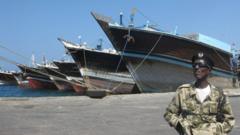Somaliland, an autonomous region that declared independence from Somalia in 1991, has firmly rejected an offer from the central Somali government to grant the United States exclusive control of the strategic port and airbase at Berbera. This port, located on the crucial Gulf of Aden, has become a focal point in the ongoing struggle for regional autonomy and international legitimacy.
Somaliland's Foreign Affairs Minister, Abdirahman Dahir Aden, criticized Somalia's offer as "desperate," emphasizing that these assets do not belong to Mogadishu to giveaway. The offer, conveyed in a letter to US President Donald Trump from Somalia's President Hassan Sheikh Mohamud, included various facilities aimed at bolstering US security operations while countering the influence of competing nations in the Horn of Africa, notably China and Russia.
The backdrop of this rejection stems from the historic quest of Somaliland for international recognition as a separate state. Following signals from the US administration that hinted at possible acknowledgment of Somaliland’s status, Minister Aden expressed confidence that there would be no stopping this quest for recognition, highlighting a growing political momentum in favor of Somaliland's sovereignty.
The Berbera port, managed by DP World from the UAE, holds significant strategic value. Minister Aden noted that the US understands the crucial dynamics of engaging with the rightful authorities regarding access to the port. The US has been active in supporting Somalia in its fight against terrorist groups like al-Shabab, and its involvement in the region has remained pivotal over the years.
Controversy surrounds the particulars of the letter in question, which refers also to the port of Bosaso in Puntland, a semiautonomous region in northeastern Somalia. The implications of Somalia's unilateral offer could potentially create further tensions with Puntland officials, who have yet to respond publicly.
The ongoing disputes over maritime rights and control of ports in the region illustrate the complex geopolitics at play in East Africa, where national borders and claims remain contested. This situation is not new; previous disputes over Somaliland’s port agreements have stoked regional tensions, such as when Turkey intervened in a prior conflict involving Ethiopia and Somaliland.
As these dynamics unfold, the regional and international ramifications will be closely monitored, especially regarding US interests and its role in stabilizing the Horn of Africa amidst competing influences.





















